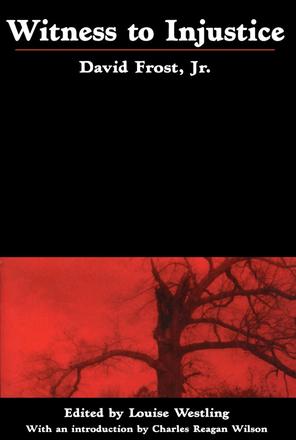
A black moonshiner and civil rights activist’s autobiographical report on complex events in southern history neglected by white historians
Description
There were two events in particular that had a lasting effect on the life of David Frost, Jr. : “Watching my parents make moonshine in our back yard in a wash pot,” he says, “and listening to my parents tell the story of how the Peterson boy was lynched here in Eufaula. My parents would tell it like it had just happened. ”
In this compelling account of his life as an African American in Eufaula, Alabama, Frost illuminates the strange world of the rural South. He was a living witness to both the dramatic racial violence and the heroic struggles of the civil rights movement. This world included lynchings as well as the quieter activities of everyday life. His story, told honestly and earnestly, pictures an alternately violent and placid community where whites not only brutalized blacks but also came to their aid.
Frost tells of the intricate web of collusion, cooperation, treachery, competition, and sometimes gleeful gamesmanship that wove together the lives of black and white people in this typical southern community. His story recounts his unique perspective on this complex social culture in which strange twists governed daily life, in which a black moonshiner evading the law might take the white sheriff hunting on his property, a culture in which a white doctor, the leader of a lynch mob, spent the rest of his life trying to atone by serving the medical needs of the black community.
Although there are multitudinous analyses, narratives, and reports detailing the baffling enigmas of southern history, in this exceptional memoir a fresh, previously unheard voice reveals cultural complexities that most historians have neglected.
Reviews
"In this powerful account, Frost, an African American moonshiner who became a civil rights activist, frankly recounts his life growing up amidst lynchings in the town of Eufaula, Alabama. Born in 1917, Frost takes readers from his childhood days of ‘living in a one-room house’ on a plantation, where he watched his financially strapped parents ‘make moonshine in our backyard in a washpot’ and listened to them ‘tell about the lynching of the Peterson boy [which] made me very afraid of white people.’ As an adult, he was in and out of jail for making moonshine, as well as for civil rights activities. He joined the NAACP and participated in the drive to register black voters, and he even met Martin Luther King Jr. Ultimately, Frost learned to live with the complex, uneasy, and twisted economic and social relations that bound blacks and whites together. This memoir is a valuable addition to the many books written on social injustice in America then and now."
- Publishers Weekly
"Self-taught local historian Frost tells the story of his life as a black Alabamian in the violent, virulently white supremacist Jim Crow South. Frost speaks for rural men who asserted their manhood confronting white men determined to keep blacks subservient in a system of racial injustice. But Frost also writes about the friendship and cooperation that whites and blacks shared. He recounts the terrorism of lynching, economic racism, the social reality behind his moonshine business, and his time in the prison labor system and involvement in voter registration. . . . Frost's autobiographical history adds the infrequently heard voice of rural black southern men to African American literature."
- Charles L. Lumpkins, Bloomsburg University Library (Pennsylvania), Library Journal